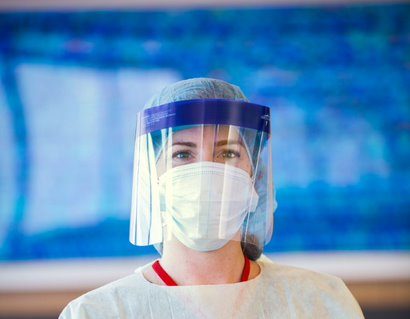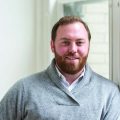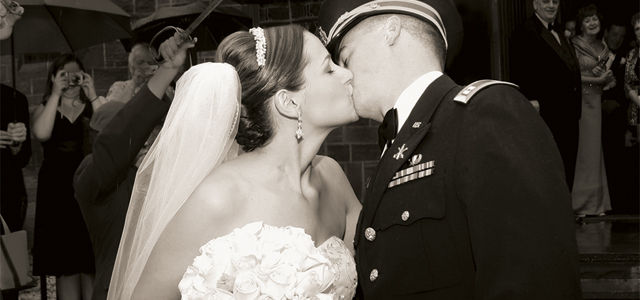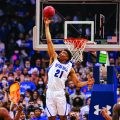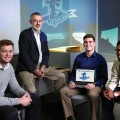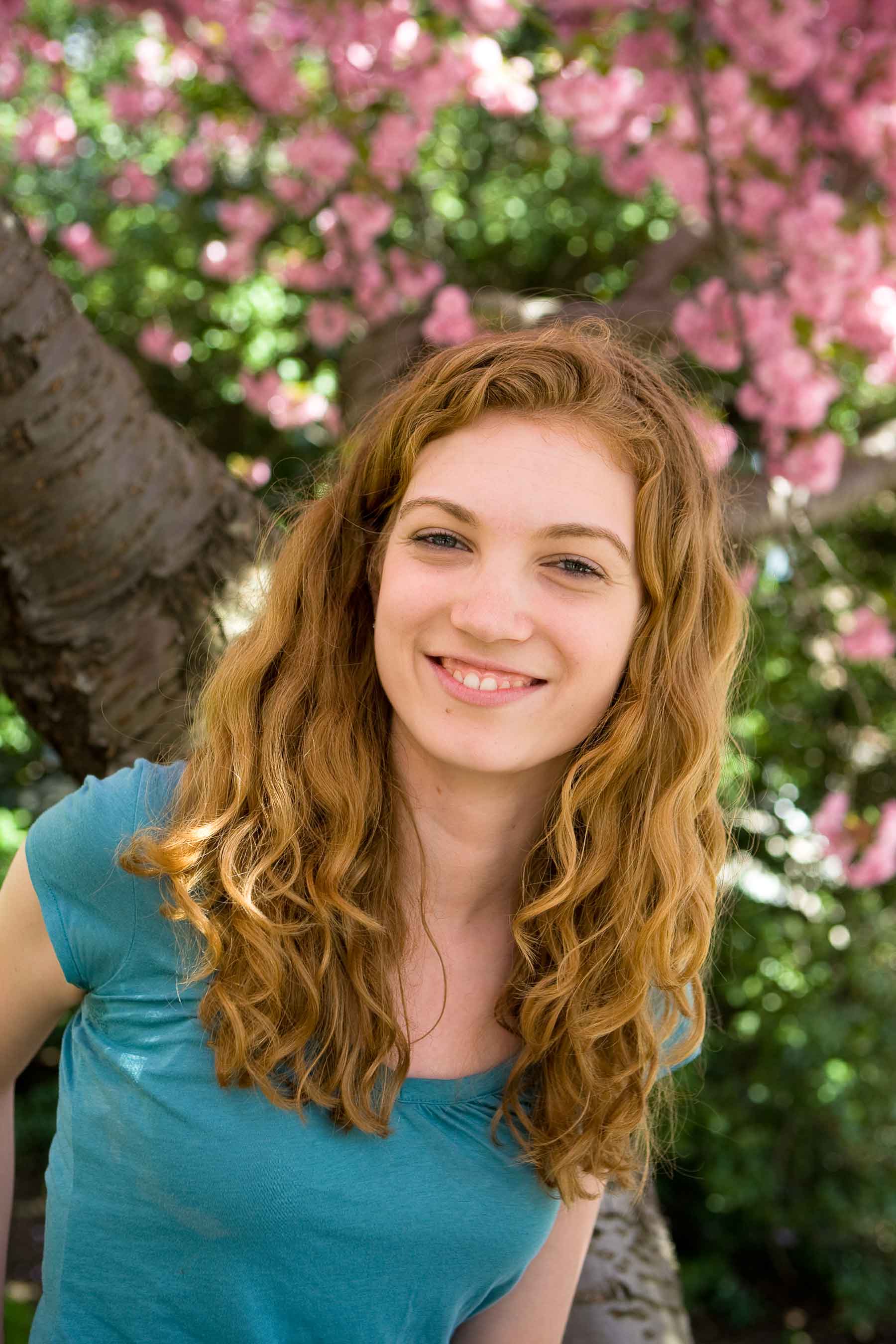The Seton Hall community responds with characteristic resilience in the face of a global pandemic.
The world has changed a lot since March, when New Jersey reported its first COVID-19 case.
In the months since in the Garden State, we endured fearsome weeks as an epicenter of the United States’ outbreak, a devastating number of deaths, harrowing job losses and economic hardships — along with a disorienting upending of our normal routines. And yet, positive shifts have also taken place: families reconnecting, hobbies rediscovered, neighbors helping neighbors, and whole groups of people reassessing their priorities.
At Seton Hall, we have always been guided by the ethos of Hazard Zet Forward, an exhortation to be persistent and to persevere, even in tough times. The stories that follow capture that spirit, along with another fundamental value we cherish: servant leadership. The vignettes here are infused with a light that shines through all the pain and fear 2020 has brought. They illustrate hope, determination, ingenuity, courage and love.
Preparing for What’s Around the Corner
Elizabeth Bigos, M.H.A. ’18
Chief nursing officer, ProHEALTH Medical Management
Bigos works for a large healthcare system that set up the first drive-thru COVID-19 testing site in New York and opened eight new urgent care locations in response to the need for care and testing.
“Despite having worked for more than 12 years as a registered nurse, I could have never imagined what this past year would teach me, both professionally and personally.”
She cites an understanding learned at Seton Hall about what it means to be a servant leader. “I knew I had a decision to make — to sit in the administrative suite and manage my team from a ‘safe distance’ or to put their needs and comforts above my own and join them in the COVID trenches. Working alongside the clinical team taught me how to be empathetic to their concerns and what they felt they needed to feel supported during this crisis.”
“Being able to care for another human being is such an incredibly humbling experience; the surroundings and diagnosis may change, but the feeling of inner peace that I get when I am able to care for a stranger will always be the reason I stay.”
Overseeing the Well-Being of More Than Half a Million People
Paschal Nwako, Ph.D. ’17
Camden County Health Officer and Public Health Coordinator
The pandemic has proven what Nwako already knew: The public health system and prevention efforts don’t get the attention that they deserve.
“It is far better and less expensive to avoid an injury or illness than to deal with the consequences. The
pandemic has revealed challenges within our public health system — however, it has been underfunded and overlooked for years.”
Nwako’s work since March has been challenging. “Public health has responded to outbreaks and pandemics for two centuries, protecting health and safety by preventing infectious diseases and other health risks, informing the public, and taking action in an outbreak. However, COVID-19 is different. It is unprecedented … with high infection and death rates compared to other pandemics.”
“Public health workers are not viewed as part of the healthcare system that is front and center in dealing with the pandemic. . . . People don’t remember that the reason the hospitals are not overflowing with patients and people are not dropping dead on the street is because of the extraordinarily work performed by public health workers in public health departments.”
Building a Medical Station for Recovering Patients at the Meadowlands
Col. Stephen McKenzie, M.A. ’20
Physician assistant, Summit Medical Group; Commander, New Jersey National Guard
Medical Command; Ordained deacon, Diocese of Paterson
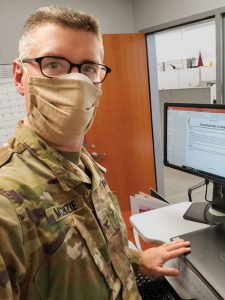
In four days, on the front lines of the pandemic, McKenzie’s National Guard team built a temporary medical station at the Meadowlands Exposition Center in Secaucus. The 250-bed facility opened in April for COVID-19 patients who were not in critical condition, easing the pressure on overwhelmed hospitals.
McKenzie worked there through June, when he was able to go back to his job as a cardiology physician assistant. “I remain concerned and prepared as we head into the winter months, unsure what is in store for us as a state and a nation.”
“Unfortunately, when there is fear and panic because of the pandemic, it’s harder for people to heal and this has had a negative psychological effect on our patients. It can also be difficult to provide the ‘human touch’ of healing — and hope — to our patients as we are constantly challenged by masks and the physical separation of social distance.
“Still, it is great to provide patients with calming care, interact with them and, with their families, plan what life will be like, when they leave the facility. It’s a joy to help sick people, whether they have COVID or not, and return them to their families.”
Serving as a Front-Line Responder
Sebin Vadasserril ’14
Nursing practice and quality manager, St. Joseph’s University Medical Center, Paterson
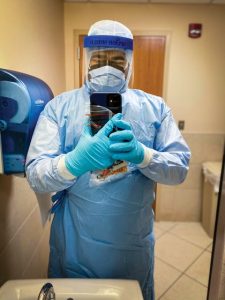
As preparations for a surge in COVID-19 cases began, Vadasserril was assigned to a command center that provided logistics tracking in the hospital system, determining how much personal protective equipment (PPE) individual units needed and coordinating testing for patients and staff; later, he transitioned to give bedside patient care in a newly converted ICU unit. The St. Joseph’s system saw patients peak at more than 130% of its ordinary capacity, with 72% of the admitted cases either testing positive or being investigated for COVID-19.
Providing care throughout the surge would not have been possible without the support of nurses who traveled to the pandemic’s epicenter to help out, plus the many unsung heroes in the dietary, housekeeping and engineering staffs and local businesses that donated food and supplies. “The abundance of support and recognition from the community helped keep morale high.”
Vadasserril hopes people will continue to take public health recommendations seriously and support each another so ultimately the virus can be overcome. “We all have a choice when working, but knowing how hard our colleagues are working to care for our patients, and each other, is all the motivation one needs to come back every day.”
Comforting Mothers With Newborns
Christine (Zuffante) Furber ’09
Registered nurse/lactation counselor, New York-Presbyterian Hospital
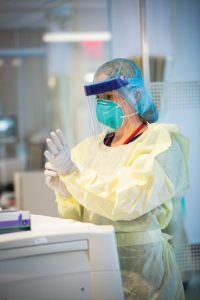
Furber relies on teamwork skills she learned as a Seton Hall varsity swimmer to manage the stress
of her job helping new mothers cope with protecting their babies during the pandemic.
“My teammates and I were dedicated and supportive of each other. When we won, we won as a team. As a nurse, I’ve developed similar relationships with my co-workers. During the pandemic we have leaned on one another every day.”
Furber’s work comes with a lot of anxiety. But she loves being there for her patients.
“I have learned so much about myself during this pandemic. I will one day share with my children the experiences of how I cared for patients during that time. … We are stronger when we work together and help each other. My co-workers and I have become closer because we were put in situations that only few can truly understand.”
Maintaining U.S./China Relations During and After the Pandemic
Professor Zheng Wang
Director, Center for Peace and Conflict Studies; School of Diplomacy and International Relations
Wang’s area of expertise is the influence of identity politics and nationalism on international relations, with a focus on China’s relationship with the United States.
The Center for Peace and Conflict Studies received a Henry Luce Foundation grant to bring together former high-ranking defense officials, academics and policy researchers from the U.S. and China for a series of online dialogues during the pandemic. “The value of this project is mainly that it keeps both sides communicating with each other during a time when we aren’t able to travel and bilateral relations are in bad shape,” Wang says.
By the end of the year there will have been 15 Zoom meetings shedding light on the Chinese and American views, identifying points of consensus where they exist, and defining conceptual and strategic differences that have hampered cooperation.
The group will publish a book based on the dialogues, with a critical essay and rebuttal on each issue by experts from both countries, each addressing the other’s misperceptions.
“The past few months have been an extremely unique experience for me. I witnessed the start and spread of the coronavirus from China and the country’s response against it. I closely followed the developments to study how China was handling this unprecedented crisis. I never imagined that New Jersey, where I reside, would become a coronavirus epicenter, forcing me to home-quarantine for several months.”
Serving as an Expert Source for News Media
Professor Yanzhong Huang
Director, Center for Global Health Studies; School of Diplomacy and International Relations
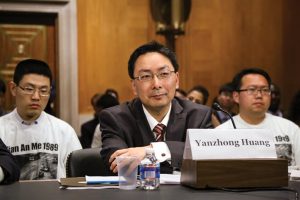
Huang is an expert on global health governance, health diplomacy and security, and public health in China and East Asia.
Since late January, when China confirmed human-to-human transmission of a novel coronavirus, he has handled about 500 media interviews — up to three to four a day — as reporters sought to understand the ramifications of the global pandemic. As the author of Governing Health in Contemporary China, he has also been in high demand for speaking engagements.
“Never before had I spent so much time dealing with media outlets. But I benefited both professionally and intellectually from the experience. The information the journalists shared with me expanded my intellectual horizon and inspired me to write thought-provoking pieces about the pandemic that were published around the world.”
Making and Distributing Hand Sanitizer for Healthcare Community
Brian Fitzpatrick ’75
Founder and CEO, Bentley Laboratories, Edison, N.J.
When COVID-19 hit, Fitzpatrick started making hand sanitizer at his beauty care products plant, churning out more than 50,000 bottles of the essential stuff and giving it all away to the medical and healthcare community as well as to first responders.
It was a job Bentley Labs could take on easily, since it already had a Food and Drug Administration permit for alcohol-based products and could follow the federal agency’s strict guidelines for making it.
“When we were distributing these, this was at a time when you could not buy them, you could not get them,” he says, noting that he and his wife, Kathleen, personally delivered at least a third of the product themselves. “We’d call and say, we are going to deliver you several hundred bottles. It was so uplifting to do something at a moment of crisis. We didn’t make anything for resale. We gave everything away.”
Donating Face Shields to Corrections Officers and Prison Healthcare Staff
Bryan Jakovcic ’09
President and owner, Fusion Health, Woodbridge, N.J.
Jakovcic’s company develops electronic health records software for prisons and this spring he received an email from a client desperate for personal protective equipment (PPE).
“They were most literally pleading if there were any connections we had where they could get PPE from,” he says, noting that since the prisons he deals with are government agencies, everything needs to go through layers of bureaucracy. “Our clients’ clinical staff was having to treat patients in a densely populated city with minimal PPE during the initial outbreak.”
Jakovcic went into partnership with a friend who owns a New Jersey manufacturing company, making and distributing 25,000 clear vinyl face shields to prison workers.
“Stillman taught me many life-skills. … The school shaped me into a businessman who keeps an eye on the horizon to see the storm coming, rather than having my head straight down looking at pavement.”
Engaging Students in SARS-CoV-2 Research
Professor D. Brian Nichols
College of Arts and Sciences, Biological Sciences
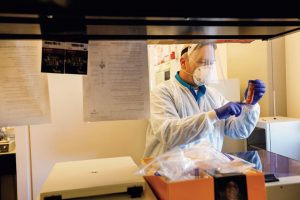
Nichols has studied the original SARS-CoV virus — the cause of severe acute respiratory syndrome, or SARS disease — and is coming up with ways he and his students can contribute to the understanding of SARS-CoV-2, the specific new virus that causes COVID-19 disease.
“Now that the labs have reopened, I’ve taken several new graduate students who will take on projects related to the virus, including studying how SARS-CoV-2 modulates the host immune response and possibly evaluating novel antiviral strategies. We’ve also discussed collaborating with other members of the biology and chemistry departments on coronavirus-related projects. Social distancing guidelines make it difficult to have too many students in the lab at the moment, so we’ve had to be creative in ways to engage undergraduate students in research.”
Undergraduate students are also designing ways to study coronaviruses using Seton Hall facilities that could be used once a vaccine becomes available and it is again safe to have multiple people in the lab.
Launching One of the First Law Classes in the Country on COVID-19
Professor Jenn Oliva
Seton Hall School of Law
Oliva was teaching Food and Drug Law this spring when it became obvious the new coronavirus would provoke many new and interesting issues of law and policy, especially regarding the Food and Drug Administration, which regulates everything from vaccines to serology tests to ventilators to PPE. She is watching the FDA closely to keep up to speed on all the issues the agency is juggling.
“COVID-19, of course, implicates virtually every area of doctrinal law that we teach, and since I knew that our students would likely face many of those challenges as new attorneys, I asked if I could teach a course that focused exclusively on COVID-19’s impact across several broad areas — including criminal law and the penal system, labor and employment law, education law, privacy law, contracts, and of course, a number of areas of healthcare law with a focus on inequities in the healthcare delivery system.”
Lawyers will have to grapple with the fallout from virus-related claims for years to come, she notes.
Oliva is spending most of her time writing and speaking about COVID-19’s impact on vulnerable patients — like essential workers, racial minorities, individuals with disabilities, and individuals who lack socioeconomic resources — and proposing legal solutions that improve access to health care instead of serving as a barrier.
Looking to WWII for Lessons in Helping Citizens Face a Crisis
Professor James J. Kimble
College of Communication and the Arts, Communication
Kimble, an expert on domestic propaganda and rhetoric in times of war and best known for uncovering the identity of the real “Rosie the Riveter,” wrote a perspective piece in The Washington Post analyzing how the American messaging effort in World War II could be used to fight COVID-19. He reminded readers that “our collective memory has forgotten the messy reality of what actually happened — and what elements of persuasion were required to mobilize people.”
While the public messages sent out during WWII were occasionally unfocused, he says, advertising firms made sure the words and images people were seeing were as uniform as possible. “The messaging today, in contrast, appears to have a meager sense of planning and cohesion at best. There is almost no comparison with the war era.”
What’s needed now, he says, is “clear, consistent, repeated messaging as much as possible to encourage Americans to take steps needed to slow the spread of the coronavirus. This message must outline the stakes in easy-to-comprehend terms and offer clear guidance for action.”
Helping Students Continue to Serve Their Mission
Michelle Peterson
Director, Division of Volunteer Efforts (DOVE)
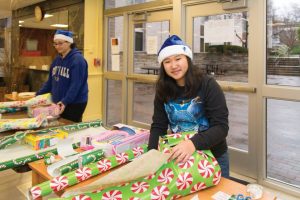
DOVE typically helps student volunteers serve vulnerable communities and groups in need, placing an emphasis on a “ministry of presence.” Though the pandemic upended this, Peterson shifted gears quickly to launch online visits with group homes and youth programs and to plan a slate of fall programs that feature social distancing.
This semester, DOVE is sponsoring online student tutorials and English as a Second Language classes, weekly discussions about service, equality, and local and international need, as well as Pillar Care Pals, a service to connect volunteers with homebound individuals. Its perennially successful toy drive was moved to October to match the academic semester’s early close. The Hunger and Homelessness Drive, running through November 24, is collecting food, warm clothing and toiletries for missions in Newark, South Orange and Philadelphia.
“The pandemic is a shared experience that has shown each of us what is important: our families, our communities, our connections. We have learned the value of everything that was suddenly taken away — schools, jobs, socialization and so much more. We have learned strength.”
Navigating an Unchartered Transition to Remote Learning
Gerald Fitzhugh II, Ed.D. ’19
Superintendent, Orange Township Public Schools
It seems an understatement: “The problems involved in teaching during the pandemic seem almost insurmountable,” Fitzhugh says. “Nothing prepared any superintendent for moving from brick and mortar to the remote space.”
In August the Orange school district held a livestreamed town meeting to present two possible “Return to School Plans” to the public, which Fitzhugh presented alongside Tina Powell, Ed.D. ’14, the district’s director of mathematics and science. In September the district started a four-phased plan that meant 100% virtual learning for the first four weeks of the school year, followed by a gradual return to the classroom for teachers in October and a small number of students in November, on limited schedules.
“The crisis has shown me how to become more resilient as well as prepared for the unknown. The work is never done. … Superintendents work 24 hours a day, seven days a week, but this work is more targeted as families may need more support, and we have to be ‘on’ to ensure we have answers to their questions.”
As Fitzhugh wrote in a welcome back letter to his district’s families, “Through remote means we will continue to embrace the students as if they were in front of us in our respective buildings.”
Providing Essential Work in a Grocery Store
Matthew Seely ’21
Supervisor, Kings Food Market, Florham Park
Seely faced customers shopping in a panic this spring, sometimes having to increase his schedule at the grocery store from 20 to 40 hours a week while he was studying full-time.
Remote learning has helped him balance the demands of his classes and his job.
Kings implemented strict safety guidelines to keep customers and staff safe, including one-way aisles, plexiglass at registers, social distancing for customers waiting in line, and double maintenance shifts. All carts, baskets, credit card machines, signs and dividers are sanitized regularly.
“I think a lot of good has come from these trials. Overall morale at the store is better because we feel like we really all are a team working to make sure everyone is happy. The numbers from the store compared to last year are up significantly, and we are on top of making sure the store stays as clean as possible.”
Seely never thought of himself as an essential worker until the start of the pandemic but is humbled by the thought of helping people feel comfortable shopping — “though it may be in a small way.”
Serving as a Vital Connection to Isolated People
Emma Sheeler ’23
Food server, Brightview Senior Living Facility
Sheeler’s job shifted dramatically in March when the pandemic hit nursing homes and assisted living facilities hard. Her work transformed from “your typical waitressing job to a true lifeline for our residents” when visitors were prohibited at facilities across the state.
As several Brightview residents passed away early in the crisis, others were quarantined in their apartments, and Sheeler began delivering meal orders to them rather than serving in the dining room. To help fight feelings of isolation, she volunteered to take residents on walks after work, and Brightview planned new activities, including a happy hour to bring additional stimulation and companionship.
“I will remember the role I played during a global pandemic for the rest of my life. There is no doubt that our residents deeply missed their families, but we all worked hard to bring them into our hearts and make one big Brightview family.”
Providing Online Outreach to the Faithful
Father Joseph Furnaguera
Parochial vicar, St. Paul the Apostle Church, Jersey City
“It took away our priesthood,” Father Furnaguera says of his experiences during the height of COVID-19 restrictions in New Jersey. “We could not pray with people at Mass, we could not visit certain hospitals, we could not be present.”
“Jesus embraced lepers and those that were considered ‘unclean’ in society. Our inner desire as priests is to be near those who are hurting, alone, and neglected because this is what Jesus does. But, COVID made everyone ‘unclean,’ including us.”
His church went online with its outreach by livestreaming Mass and posting videos, including one featuring parishioners sharing words of encouragement and hope.
“It inevitably brings tears to my eyes because it reminds me of how miserable that time was. I know how much individuals were suffering. I would spend a few hours on the phone every day, and we had about three to four burials a week.”
He is haunted by four parishioners he knew well whom he couldn’t comfort in their last hours. “They died without the sacraments. I will remember them for the rest of my life because I carry a similar guilt as their family due to the fact that I was not able to visit them and do my priestly duty by administering the sacraments.
I pray for those four regularly, for their families, and for all the families and individuals that were affected by the virus.”
Starting an Oral History Project on the Pandemic
Seton Hall University Libraries staff
The University Libraries launched a collection of personal narratives called “Together Again” to document how life in the Seton Hall community has changed due to COVID-19. Participants submit short video or audio recordings sharing personal stories and reflections. So far, the project has received more than 60 responses.
“Our current social fragmentation results from our caring for each other,” says Sarah Ponichtera, assistant dean of special collections and the gallery, one of the many people working on the collection, which is posted online. “We hope this project, and others like it, allow that fundamental truth to shine through.”
“Together Again” will remain open for submissions until the pandemic is declared over, but Ponichtera hopes future historians will use it to experience how COVID-19 affected society.
By Shanice Casimiro and Kim de Bourbon

